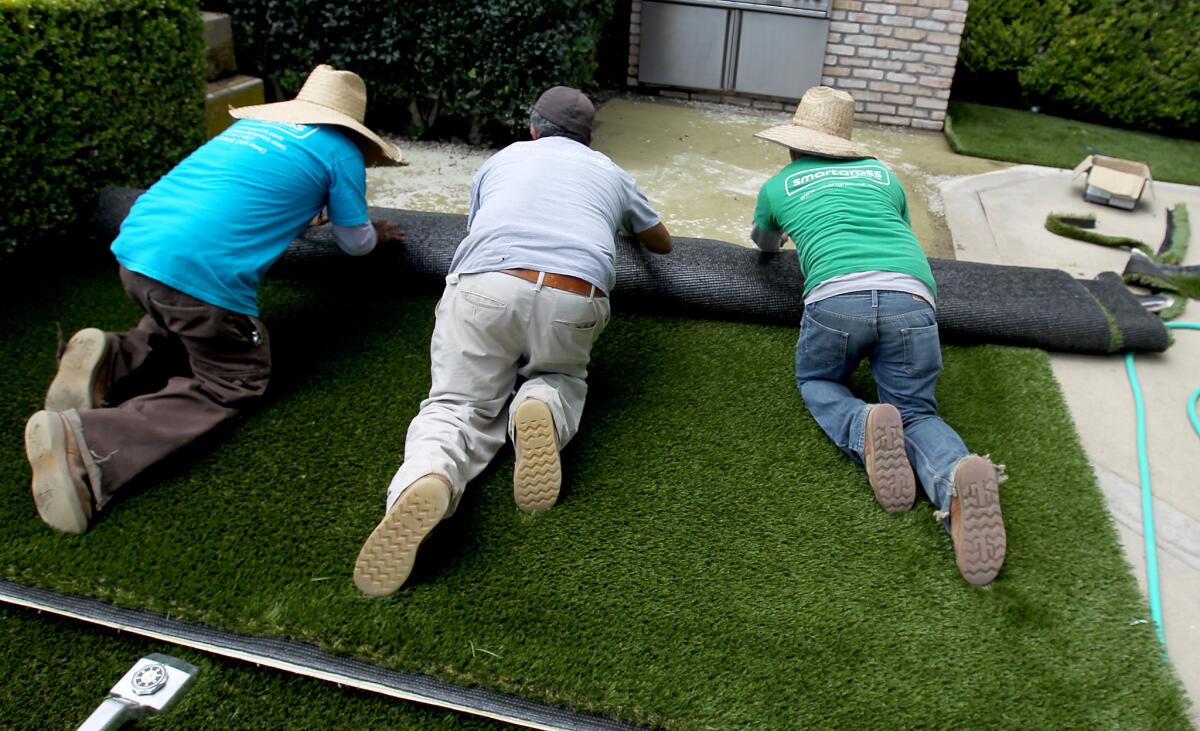Gov. Brown acts to protect homeowners installing artificial turf

A crew from Smartgrass Synthetic Turf installs artificial grass in the backyard of a home in Pacific Palisades.
- Share via
Reporting from Sacramento — California homeowners who replace their water-gulping grass lawns with artificial turf in response to the drought would be protected from sanctions by homeowner associations under one of 10 bills signed Friday by Gov. Jerry Brown.
Assemblywoman Lorena Gonzalez (D-San Diego) introduced the measure, which prohibits homeowner associations from barring the installation of synthetic turf, a drought-conscious alternative to grass lawns.
The measure, AB 349, goes into effect immediately. While most homeowners are free to install artificial turf, about 4.8 million homeowners bought in common interest developments such as condominium projects where a homeowners association can regulate yard use.
“Across the state, Californians are making great strides to reduce their water use and hit aggressive benchmarks for conservation, and this new common sense law will give homeowners one more way to save as this drought continues,” Gonzalez said in a statement. “The grass may be fake, but the amount of water a homeowner can save by installing it is very real.”
NEWSLETTER: Get the day’s top headlines from Times Editor Davan Maharaj >>
She said the state estimates that landscape irrigation represents 43% of urban water use.
The governor also signed a bill that allows electric fences to be installed in non-residential neighborhoods after Sen. Isadore Hall III (D-Los Angeles) noted that many cargo and storage companies have millions of dollars’ worth of products in their yards that are vulnerable to theft.
Hall’s anti-theft bill, SB 582, requires signs warning people about the hazard of touching an electric fence.
Brown on Friday vetoed a measure that would have prohibited the general counsels for cities, counties and districts from having direct oversight over internal audit staff.
Sen. Ben Hueso (D-San Diego) introduced SB 481 so the public can see the audits findings. He noted that some cities have their general counsel oversee audits so the findings become classified as attorney-client privilege and can be kept from public disclosure.
Gov. Brown said in a veto message that he appreciated the intent to make the process more transparent.
“However, there may be legitimate reasons for local agencies to have their general counsels oversee certain audits and I believe it is most appropriate to allow local governments to determine the level of oversight that best meets their unique civic needs,” he said.
ALSO
California Senate acts to ban use of plastic microbeads by 2020
California Assembly Democrats pick Anthony Rendon to be next speaker
News photographers call on California Gov. Jerry Brown to veto drone restrictions
More to Read
Sign up for Essential California
The most important California stories and recommendations in your inbox every morning.
You may occasionally receive promotional content from the Los Angeles Times.












